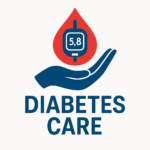Diabetes Management
Sleep
Recover
Balance
Repair

Glucose Control
Metabolism
Health
Impact of Sleep on Diabetes
Overview
Sleep is as vital to diabetes management as diet, exercise, and medication. Yet, it is often overlooked. For people with diabetes, sleep quantity and quality directly affect blood sugar control, insulin sensitivity, hormone regulation, and mental well being. Chronic sleep problems can not only worsen diabetes but also increase the risk of developing it.
The Science Behind Sleep and Blood Sugar Regulation
1. Hormonal Balance
Sleep helps regulate hormones that affect hunger, metabolism, and insulin activity:
Insulin: Sleep promotes normal insulin sensitivity. Poor sleep leads to insulin resistance.
Cortisol: A stress hormone that rises with sleep deprivation, increasing blood sugar.
Leptin and Ghrelin: Hormones that regulate appetite. Sleep deprivation reduces leptin (satiety hormone) and increases ghrelin (hunger hormone), leading to increased food intake.
2. Glucose Metabolism
During deep (slow wave) sleep, the body enters a state of glucose conservation and repair, reducing insulin resistance and stabilizing blood sugar levels. Lack of quality sleep disrupts this balance, impairing glucose tolerance the following day.
Effects of Poor Sleep on Diabetes
1. Insulin Resistance
Even one night of poor sleep can reduce insulin sensitivity by up to 25%.
This leads to higher fasting blood glucose and greater blood sugar variability.
2. Increased Appetite and Weight Gain
Sleep deprived individuals tend to crave carbohydrate rich and sugary foods, which spike blood sugar.
Disrupted appetite regulation leads to overeating, increasing the risk of obesity, a key risk factor for Type 2 diabetes.
3. Elevated Cortisol and Stress
Chronic sleep deprivation increases cortisol, a hormone that raises blood sugar.
Stress levels rise with lack of rest, worsening both glucose control and emotional health.
4. Disrupted Circadian Rhythms
Irregular sleep wake cycles (e.g., night shifts, jet lag) confuse the body’s internal clock, affecting insulin production and blood sugar rhythms.
This is especially concerning for people with Type 2 diabetes, as glucose tolerance varies by time of day.
5. Impaired Immune Function
Poor sleep weakens the immune system, increasing the risk of infections and slower wound healing, both common complications in people with diabetes.
Sleep Strategies
How Much Sleep Is Ideal for People with Diabetes?
Most adults should aim for 7–9 hours of sleep per night.
Both short sleep (<6 hours) and long sleep (>9 hours) have been associated with poorer blood sugar control and increased risk of Type 2 diabetes.
Strategies to Improve Sleep for Better Diabetes Control
1. Establish a Consistent Sleep Routine
-
Go to bed and wake up at the same time every day, even on weekends.
2. Create a Sleep Friendly Environment
-
Keep your bedroom cool, dark, and quiet.
-
Avoid screens (phones, TVs) for at least 30–60 minutes before bed.
3. Wind Down with Relaxation Techniques
-
Try deep breathing, progressive muscle relaxation, or guided meditation.
-
Limit stimulating activities (e.g., late night work or news consumption).
4. Be Mindful of Evening Food and Drink
-
Avoid heavy meals and caffeine close to bedtime.
-
Alcohol may initially cause drowsiness but can disrupt REM sleep and cause blood sugar spikes overnight.
5. Monitor Nighttime Glucose
-
Blood sugar swings (high or low) can disrupt sleep.
-
Use a Continuous Glucose Monitor (CGM) to track patterns overnight.
-
Prevent nighttime hypoglycemia with a balanced evening snack if needed.
6. Stay Active, But Not Right Before Bed
-
Regular physical activity improves sleep and blood sugar control.
-
Try to finish intense workouts at least 2–3 hours before bedtime.
7. Treat Underlying Sleep Disorders
-
Talk to your doctor about symptoms like snoring, gasping, or frequent awakenings.
-
Consider a sleep study to assess for sleep apnea or other conditions.
Sleep and Diabetes Complications
Poor sleep may worsen the progression of:
Diabetic neuropathy: Painful nerve damage may increase at night, further disrupting sleep.
Kidney disease (nephropathy): Linked to sleep apnea and poor rest.
Retinopathy: Associated with poor glycemic control and elevated blood pressure during sleep.

